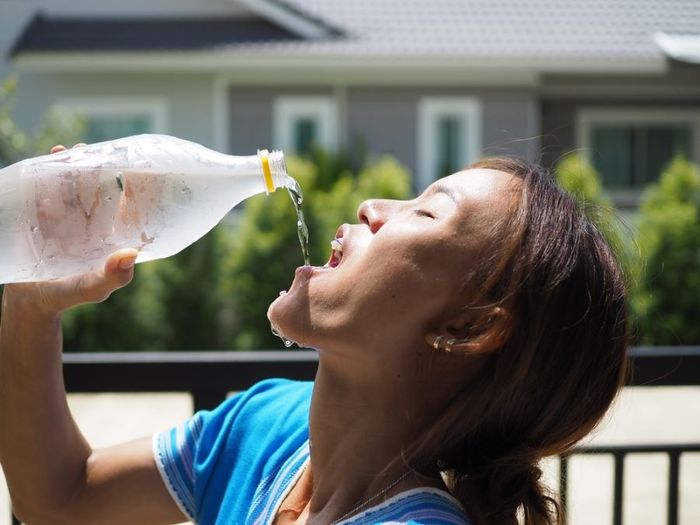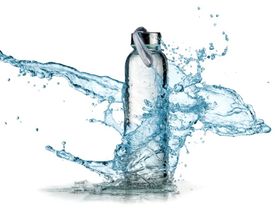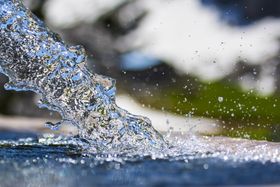Why Reusing Plastic Water Bottles Is Damaging Your Health
Updated February 12, 2024.

One million plastic drinking bottles are bought around the world every single minute. This creates a huge amount of waste that ends up in oceans and landfills. It's common practice for people to reuse plastic water bottles by refilling them. It saves money, avoids having to repeatedly buy new bottles, and reduces the amount of plastic waste.
However, these bottles were not meant to be reused. Recent revelations about the toxic chemicals found in plastic bottles should be enough to prevent anyone from reusing them—or buying them in the first place. While reusing your plastic bottle is convenient, we've outlined why it’s not the best idea to carry on with this practice.
» Discover more about different water types
Risks of Reusing Plastic Water Bottles
Apart from the environmental impact of plastic water bottles, there are two significant health risks associated with reusing these bottles.
- Chemical leaching Most single-use plastic bottles are made from flimsy material, which gets damaged through normal wear and tear, and while being washed. Repeatedly using a plastic bottle significantly increases the chance that chemicals will leak out of the tiny cracks in the bottle that develop over time. One of these chemicals is bisphenol A (BPA), which has been linked to some serious health risks like fertility issues, breast and prostate cancer, diabetes, and metabolic disorders.
- Bacteria Plastic bottles also harbor harmful bacteria, which can be just as dangerous, if not more dangerous, than chemical leaching. Scratches and cracks can not only cause chemical leaching, but are the ideal spot for bacteria to thrive. Bacterial growth happens very quickly by simply placing your mouth on your bottle and it can be difficult to remove, even with a thorough cleaning. Studies have revealed that water bottles that go uncleaned for a week contain 300,000 bacteria cells per square centimeter, which is more bacteria than in a dog’s water bowl.
How Long Can You Reuse A Plastic Water Bottle?
Most water bottles will display a number printed inside a triangle, which shows what kind of plastic the bottle is made from. That number also determines how often the bottle can be reused before it becomes unsafe.
Here are three of the most common plastics water bottles are made from:
- Polyethylene terephthalate (PET) If there is a "1" in the triangle, it means it was made using PET plastic. This is a very lightweight plastic that's commonly used for water bottles and containers like nut butter, sauce bottles, and other food packaging. It's intended for single-use applications, and repeated use increases the risk of leaching and bacterial growth.
- High-density polyethylene (HDPE) If there is a "2" in the triangle, it means it was made using high-density polyethylene. HDPE is a more sturdy, durable plastic, which makes it a good material for detergent bottles, soap bottles, and gallon-size liquid containers. HDPE is reusable.
- Other (BPA, Polycarbonate and LEXAN) If there is a "7" in the triangle, it means it was made using materials that don’t fit under any other category. Some water bottles in this category may contain BPA. These plastics are not for reuse.
Safe Alternatives to Plastic Bottles
There are several water bottle materials that are safe alternatives to plastic bottles, including:
- Glass Glass as opposed to plastic bottles may be fragile, but they are sterile, don't affect the taste of the water, and don't leach any harmful chemicals.
- Stainless Steel Stainless steel bottles are typically lined so that there's no metallic taste in the liquid they hold. They are sterile and durable.
- Reusable Plastic Bottles Plastic water bottles are not all bad. It depends on the type of plastic used to make the bottle. Most reusable plastic water bottles are manufactured from plastic polymers like polypropylene and copolyester. Make sure that the bottle you are choosing is BPA-free.
Conclusion
Reusing a plastic water bottle might feel like an eco-friendly alternative because you’re not throwing the bottle away after every use. However, with the potentially harmful effects of reusing plastic water bottles on human health and their impact on the environment, the best decision is to skip single-use plastic altogether.








